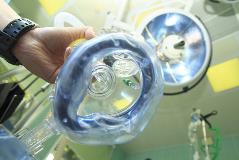
Signed affidavits (assistants) and CPR/BLS cards are required to be uploaded when registering for courses.
2025 Fall Class Schedule:
October 15th UIC, Chicago, IL
https://cvent.me/B1M8Pa
November 1st SIU, Alton, IL
https://cvent.me/m253GA
December 3rd UIC, Chicago, IL
https://cvent.me/5MRllE
Course affidavit found here.
Administration & Monitoring of Nitrous Oxide
Staff of an ISDS Member Dentist receive discounted pricing on courses
Clinical Certification Course for Dental Auxiliary
Target Audience: Dental Assistants for monitoring & Dental Hygienists for monitoring and administering
Prerequisite:
Must be currently certified in BLS for healthcare providers or its equivalent. A copy of your current BLS card must accompany registration form.
In accordance with Section 1220.245 of the Rules for the Administration of the Dental Practice Act of the State of Illinois, a dental assistant must be at least 18 years of age and has 1000 hours of clinical dental assisting experience or has graduated from a dental assisting program accredited by the Commission on Dental Accreditation of the American Dental Association, or is a currently certified dental assistant as designated by the Dental Assisting National Board, Inc. to perform the task of monitoring Nitrous Oxide.
Fees:
$295 ISDS Member dentist staff
$525 Non-member dentist staff
Instructors: Dr. Hill and Dr. Schuette
This course for monitoring and administration of nitrous oxide by the allied dental personnel is designed to meet the certification requirements of the State of Illinois for expanded functions. This course will include both didactic and clinical components in the monitoring and administration of nitrous oxide and advanced airway management. It will provide instruction in anatomy, physiology, pharmacology, and dental emergencies, as they relate to the use of nitrous oxide in the dental office. This course is open to all qualified dental assistants for monitoring and dental hygienists for administering. After successful completion of this course the dental assistant can return to the private office and provide expanded function for the dental team and the monitoring of nitrous oxide, while the dental hygienists will be able to start and stop the flow of gas.

